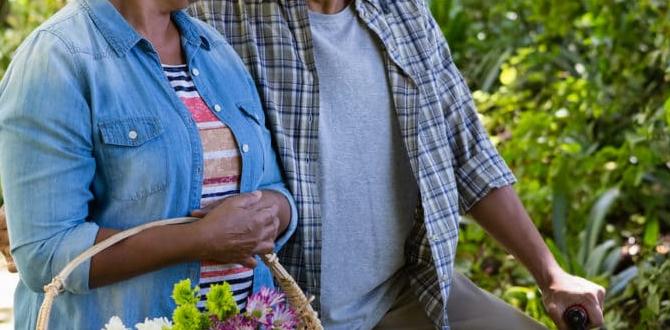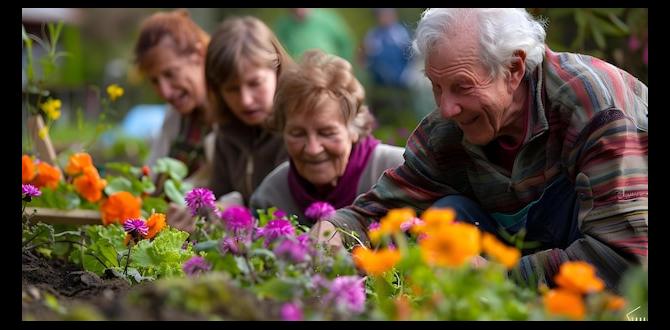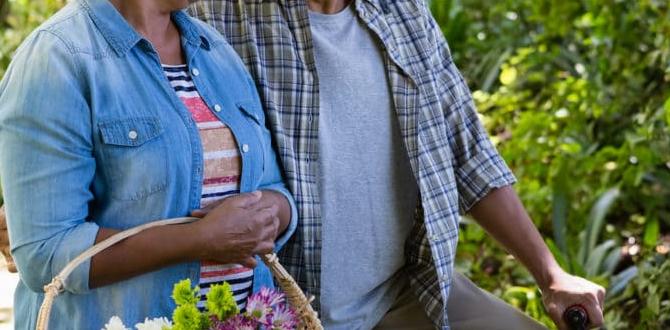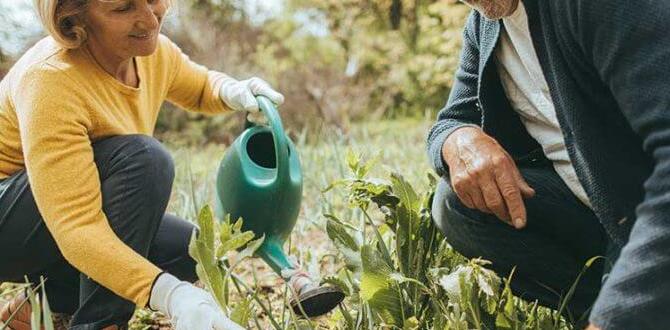Have you ever watched an elderly person smile while tending to their garden? Gardening can be more than just planting flowers. It offers many amazing benefits for seniors.
Did you know that gardening can help improve mood and reduce stress? Imagine spending time outside, surrounded by plants. It feels fresh and energizing, doesn’t it?
Not only does gardening provide fresh air, but it also keeps the body active. Simple tasks like weeding or watering can strengthen muscles and improve balance. This helps older adults stay fit and agile.
Gardening also brings a sense of achievement. Watching plants grow can make anyone feel proud. As they nurture life, they also nurture their own happiness.
In this article, we will explore the many benefits of gardening for the elderly. Whether it’s growing vegetables or simply enjoying flowers, there are countless reasons for seniors to dig in the dirt and enjoy the great outdoors.
Exploring The Benefits Of Gardening For The Elderly Individuals

Benefits of Gardening for the Elderly
Gardening offers great benefits for the elderly. It provides physical exercise, which helps improve strength and mobility. Have you noticed how relaxed a garden can make you feel? The soothing sounds and colors boost mental health too. Many seniors find joy in growing their own fruits and vegetables, leading to healthier eating. Plus, gardening can spark social connections through community gardens. Did you know spending time with plants can lower stress levels? It’s a perfect blend of fun and wellness!Physical Health Benefits
Enhances strength and flexibility. Improves cardiovascular health.
Gardening is like a secret superhero workout for seniors! It boosts strength and flexibility as they stretch to reach for that sneaky tomato or bend to pull out stubborn weeds. Regular digging and planting can even make their hearts happy and healthy. A little dirt under the nails means a lot of moving around, which keeps the cardiovascular system in tip-top shape. Plus, who knew that battling pesky weeds could be good for your heart? Let’s dig into some more fun facts!
| Benefit | Description |
|---|---|
| Strength | Gardening helps build muscle tone through lifting pots and digging. |
| Flexibility | Kneeling and stretching during gardening keeps the body limber. |
| Cardiovascular Health | Active gardening raises heart rate and improves blood circulation. |
Mental Health Advantages
Reduces symptoms of depression and anxiety. Boosts cognitive function and memory.
Gardening offers many mental health benefits for the elderly. It can help reduce symptoms of depression and anxiety. Spending time with plants lifts spirits and brings joy. Plants need care and attention, which provides a sense of purpose. This activity also boosts cognitive function and memory. Engaging with nature can strengthen the brain’s connections and improve focus. A garden is not just a place for flowers; it’s a space for happiness and health.
How does gardening help mental health?
Gardening can lift mood and sharpen the mind. Studies show it reduces feelings of sadness and improves memory skills. Many elderly people find peace in tending to their plants. It connects them to nature and gives them a reason to smile.
Social Interaction and Community Building
Offers opportunities for socialization. Encourages participation in community gardening projects.
Gardening brings people together. It helps seniors make new friends and share experiences. Working side by side in gardens fosters a sense of community. Many neighborhoods create community gardening projects. These projects invite everyone to join. Here are some benefits:
- Improves social skills
- Builds connections with neighbors
- Creates a sense of belonging
In these groups, everyone learns from each other. It makes gardening more fun and exciting!
What are the social benefits of gardening?
Gardening helps seniors connect with others, reducing loneliness and improving mental health. They can share ideas, tools, and stories, making each day brighter.
Connection with Nature
Promotes mindfulness and relaxation. Increases vitamin D levels through sun exposure.
Spending time in the garden helps many people feel calm and happy. It connects us to nature, allowing for mindfulness and relaxation. The gentle sights and sounds of plants, birds, and insects can soothe the mind. Sunlight is also a key player; it boosts vitamin D levels. This vitamin is important for strong bones and a healthier mood. Enjoying a sunny garden can be both fun and beneficial!
Why is sunlight important for garden activities?
Sunlight increases vitamin D levels, which supports good health.
Other benefits of gardening outdoors:
- Better mood and mental health.
- More energy and focus.
- Lower stress levels.
Accessible Gardening Techniques
Raised garden beds for ease of access. Container gardening for limited mobility.
Gardening can be easy for seniors with special techniques. Raised garden beds are a great choice. They reduce bending and make planting simple. Container gardening also helps. It allows the elderly to grow plants without needing to kneel or reach too far. Here are benefits of these methods:
- Less strain on the back
- Easy access for watering
- Portable for limited spaces
- Can be done while sitting
By using these methods, gardening becomes more enjoyable. It is a nice way for the elderly to connect with nature.
What are some easy gardening options for seniors?
Some great options include raised beds and container gardening. They make it easier for seniors to grow plants without much strain.Emotional Well-being and Purpose
Fosters a sense of accomplishment. Provides a routine and structure in daily life.
Gardening can really boost emotional wellbeing for older people. It provides a sense of accomplishment when they grow plants successfully. Sees those bright blooms or vegetables can make anyone smile! Furthermore, having a garden creates a daily routine. This structure can bring calm and purpose to their day. It’s something to look forward to, helping define their day with joy.
Why is gardening good for feelings?
Gardening helps people feel proud of what they grow and adds hope to their routine.
- Improves mood
- Boosts confidence
- Creates daily plans
Tips for Getting Started
Recommended plants for elderly gardeners. Essential gardening tools to simplify the task.Ready to dig in? Start with easy-to-grow plants, like herbs and pansies. They cheer up a garden and need little fuss. For tools, a sturdy, lightweight trowel and long-handled pruners are best. These make gardening a walk in the park—no heavy lifting required! Here’s a quick table to help you pick the right plants and tools:
| Plants | Tools |
|---|---|
| Herbs (basil, mint) | Lightweight trowel |
| Marigolds | Long-handled pruners |
| Tomatoes | Garden gloves |
| Pansies | Watering can |
With these tips, gardening will turn into your new favorite hobby. Who knew playing in the dirt could be so rewarding and fun? Happy gardening!
Conclusion
In conclusion, gardening offers many benefits for the elderly. It helps keep you active, boosts mood, and provides fresh food. Gardening also connects you with nature and can foster friendships. If you want to explore this further, consider starting a small garden or joining a gardening club. Enjoy the rewards of planting and watching life grow!FAQs
What Are The Physical Health Benefits Of Gardening For Elderly Individuals?Gardening helps older people stay active. When you dig, plant, and pull weeds, you exercise your muscles. This movement can make you stronger and more balanced. Fresh air and sunshine also help your mood. Plus, growing fruits and vegetables can make you healthier!
How Does Gardening Support Mental Well-Being And Cognitive Function In Older Adults?Gardening helps older adults feel happy and relaxed. When you dig in the dirt and water plants, it can lift your mood. Being outside in nature is also calming. It can even help keep your mind sharp by remembering names of plants or planning a garden layout. Plus, growing flowers or veggies gives a sense of pride and accomplishment!
In What Ways Does Gardening Promote Social Interaction And Community Engagement Among Seniors?Gardening helps seniors meet new friends. They can work together in the same garden. Sharing plants and flowers makes talking easier. It also gives them a chance to learn from each other. When we garden, we become part of a friendly group.
What Modifications Can Be Made To Gardening Practices To Accommodate The Physical Limitations Of Elderly Gardeners?We can make gardening easier for older people in many ways. First, we can use raised garden beds. These are higher, so you don’t have to bend down much. Second, we can choose lightweight tools that are easier to hold. Adding sit-down benches lets you rest while you work. Lastly, growing plants that need less care can make gardening more fun!
How Does The Act Of Gardening Contribute To A Sense Of Purpose And Fulfillment In The Lives Of Elderly People?Gardening helps elderly people feel important and useful. When you grow plants, you care for them every day. This brings joy and pride as you watch them grow. It gives you goals to achieve and something to look forward to. Plus, being outside and working with nature can make you feel happy!








